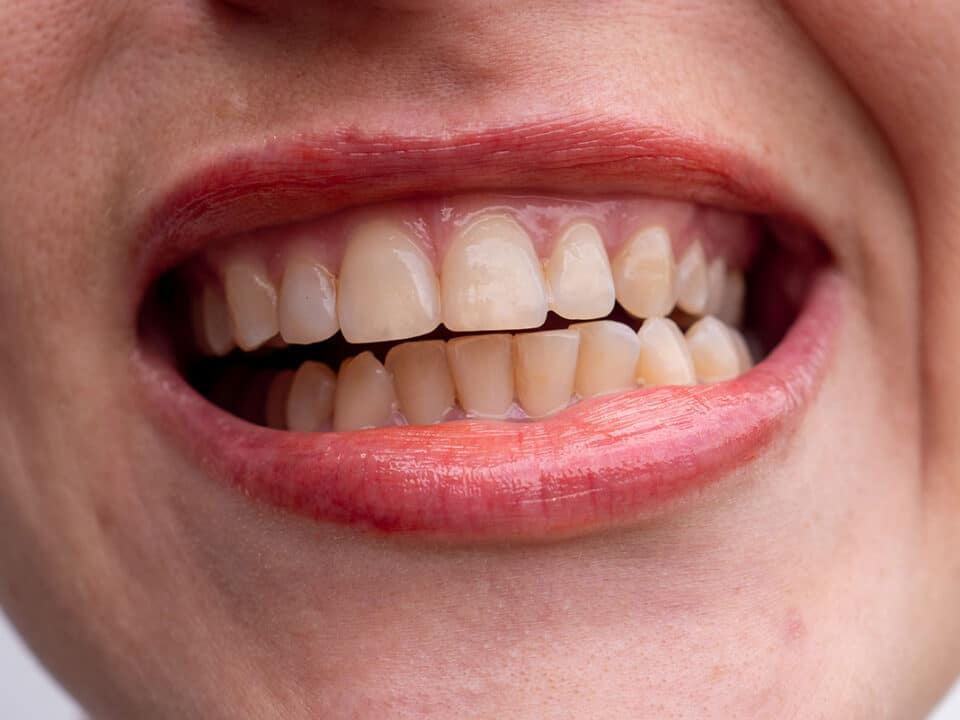Congratulations, you’re expecting! Now like all aspects of your health during pregnancy, dental care just became more important than ever. Being pregnant means your risk of infection, tooth decay, gum disease and other complications is higher than normal and staying on top of your dental health is crucial.
The problem is that a large percentage of mothers are wary of visiting the dentist when they’re expecting, in the belief that dental care can be harmful to their baby. While erring on the side of caution is usually a good idea, avoiding the dentist while pregnant is a big issue because it means that mothers might not be getting the dental care they need at such a crucial time.
Table of Contents
Can you go to the dentist while pregnant?
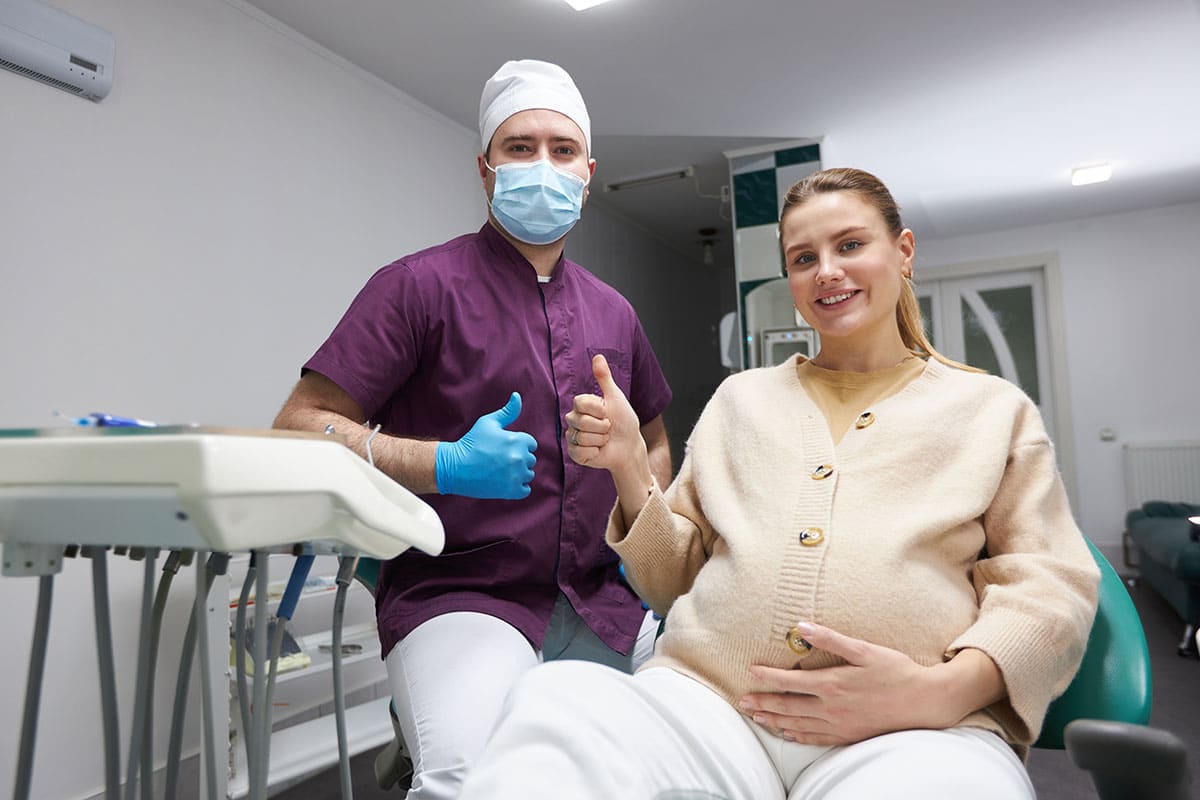
Going to the dentist while pregnant isn’t just ok; it’s an absolute must. Untreated oral infections, tooth decay, gum disease, or other oral health concerns can be especially harmful while pregnant and pose a significant risk to your baby’s health.
You’re probably familiar with having a professional cleaning and check-up at least every six months, but being pregnant means you might be better off visiting the dentist more often. The hormonal changes your body is going through put you at greater risk of infection and other oral health issues, gingival inflammation and infections being the main concerns.
Your dentist will be able to watch the health of your teeth and gums, give you advice if your oral care routine needs to be adjusted, and ensure your mouth stays healthy. The health of your mouth and your body are directly related and, therefore, to your child’s health. For these reasons, visiting your dentist during pregnancy is important, and you might be asked to book more frequent appointments until your baby is born.
Why is dental care during pregnancy important?
Pregnancy exerts an impact on your dental well-being by inducing a range of alterations in your bodily functions and daily habits, potentially elevating your vulnerability to specific oral health issues:
Hormonal changes can trigger “pregnancy gingivitis”
Many women observe heightened sensitivity, inflammation, or bleeding of gums during pregnancy. This arises from hormonal changes causing raised levels of estrogen and progesterone, which foster inflammation in the gum tissue surrounding your teeth. Without appropriate attention, this gingivitis could escalate into more severe gum disease.
Morning sickness can erode your teeth
Instances of vomiting expose your teeth to stomach acid, potentially exacerbating the risk of tooth decay.
Modifications in dietary practices can contribute to tooth decay
Nausea and aversions to certain foods, typical pregnancy symptoms, might undermine your ability to consume balanced meals during regular mealtimes. Consequently, you might be frequently snacking, exposing your teeth to additional acids, sugars, and starches that nourish bacteria, causing decay.
Disruptions in your regular routines can impede your daily oral regimen
Given the fatigue linked with pregnancy and the disruptions in sleep patterns, you might find yourself eager to retire for the night. Such heightened weariness might lead you to consider omitting your nightly brushing and flossing routine.
It is best to try and avoid oral health problems, especially when pregnant, and proper dental care combined with frequent dental checkups is the best way to stay healthy. Adhering to preventive dental care measures and promptly addressing any symptoms safeguards not only your health but also the well-being of your precious child.
Is going to the dentist dangerous during pregnancy?
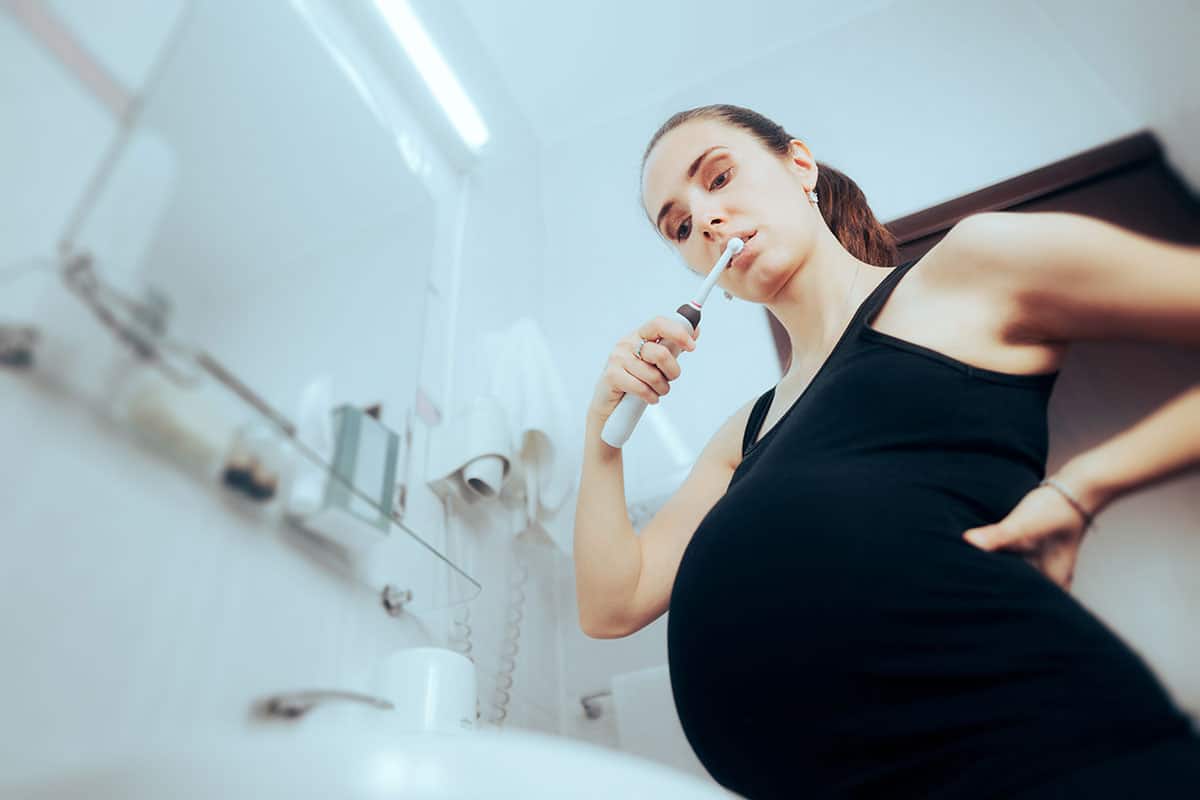
Dental care is not inherently dangerous during pregnancy, and pregnant individuals must continue caring for their oral health. Maintaining good oral hygiene and addressing dental issues is crucial during pregnancy to prevent potential complications.
There are, however, certain best practices to keep in mind when it comes to dental care during pregnancy. Things to consider include:
Proper communication with your dentist
Proper communication with your dentist and healthcare provider means telling them everything, including that you are pregnant, especially if you require dental procedures beyond routine cleanings and check-ups. This allows them to tailor the treatment and medications to your pregnancy status.
Time dental procedures carefully
If possible, elective dental procedures are often postponed until the second trimester or after childbirth to minimize any potential risks, even though many routine procedures can be safely performed during any trimester.
Limit or avoid x-rays
While dental X-rays are generally safe with proper shielding, they should be minimized during pregnancy. If an X-ray is necessary, your dentist will take precautions to minimize radiation exposure.
Be careful taking certain medications
Some dental procedures may require medications, such as local anesthetics or antibiotics. Your dentist will choose medications that are considered safe during pregnancy. Always provide a complete list of medications you’re taking, including prenatal vitamins.
Avoid uncomfortable positions or long appointments
During dental procedures, your dentist will ensure you are positioned comfortably and safely to avoid putting pressure on your abdomen.
Understand the risks associated with anesthesia
Local anesthesia is generally considered safe during pregnancy. However, some dentists may recommend avoiding general anesthesia during the first trimester if it’s not medically necessary.
What if I have a tooth infection while I’m pregnant?
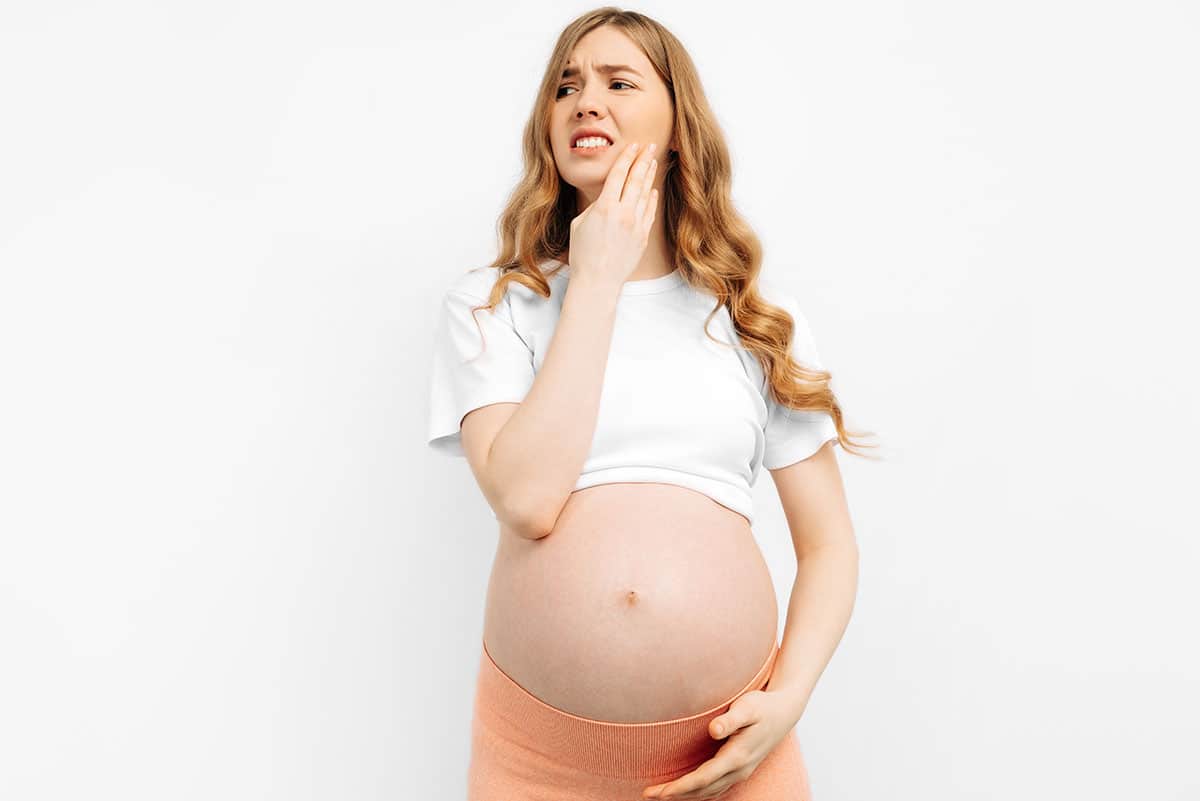
If you suspect you have a tooth infection while pregnant, it’s important to address the issue promptly to ensure your oral health and your baby’s well-being. Tooth infections, also known as dental abscesses or dental infections, can lead to complications if left untreated.
If a problem arises, such as advanced stages of tooth decay, tooth abscess and gum disease, these could result in infections. If a mouth infection occurs during pregnancy, it can spread to other parts of your body, including your baby. Oral infections are quite dangerous due to the proximity to the brain, nerves and major blood vessels. What starts as a minor issue can escalate into a real problem without proper care and management.
Furthermore, as bacteria can be transmitted from mother to baby, an abundance of decay-causing bacteria in your mouth might lead to a high concentration in your child after birth.
Consult your dentist’s office immediately and make sure to inform them of your pregnancy. They will be able to assess the severity of the issue and recommend an appropriate treatment plan.
Is it safe to take antibiotics during pregnancy?
Antibiotics may be required to control the infection before further treatment is performed. Not all antibiotics are pregnancy safe, and even those that are deemed safe should be avoided if possible. That said, an infection poses a greater health risk to you and your baby than antibiotics and needs to be eliminated quickly.
If you are prescribed antibiotics during your pregnancy, it is recommended to protect your gut health by adding a probiotic and incorporating live culture yogurt, mushrooms and fermented foods like sauerkraut or kimchi into your diet.
Are dental X-rays safe during pregnancy?
Even though many procedures require them, it’s common for pregnant mothers to be wary of X-rays when visiting the dentist.
Modern dental X-rays are safe during pregnancy because they utilize a very low level of radiation, with a single X-ray not enough to have any adverse effects on a growing fetus. However, your dentist will still take every precaution, and a lead apron will shield your baby while a thyroid guard keeps you safe.
While dental X-rays are safe, it’s common practice to try and avoid them during the first trimester for regular checkups. Only in cases where an X-ray is necessary for effective treatment, like during a dental emergency, will your dentist request one.
Are there any alternatives to dental X-rays?
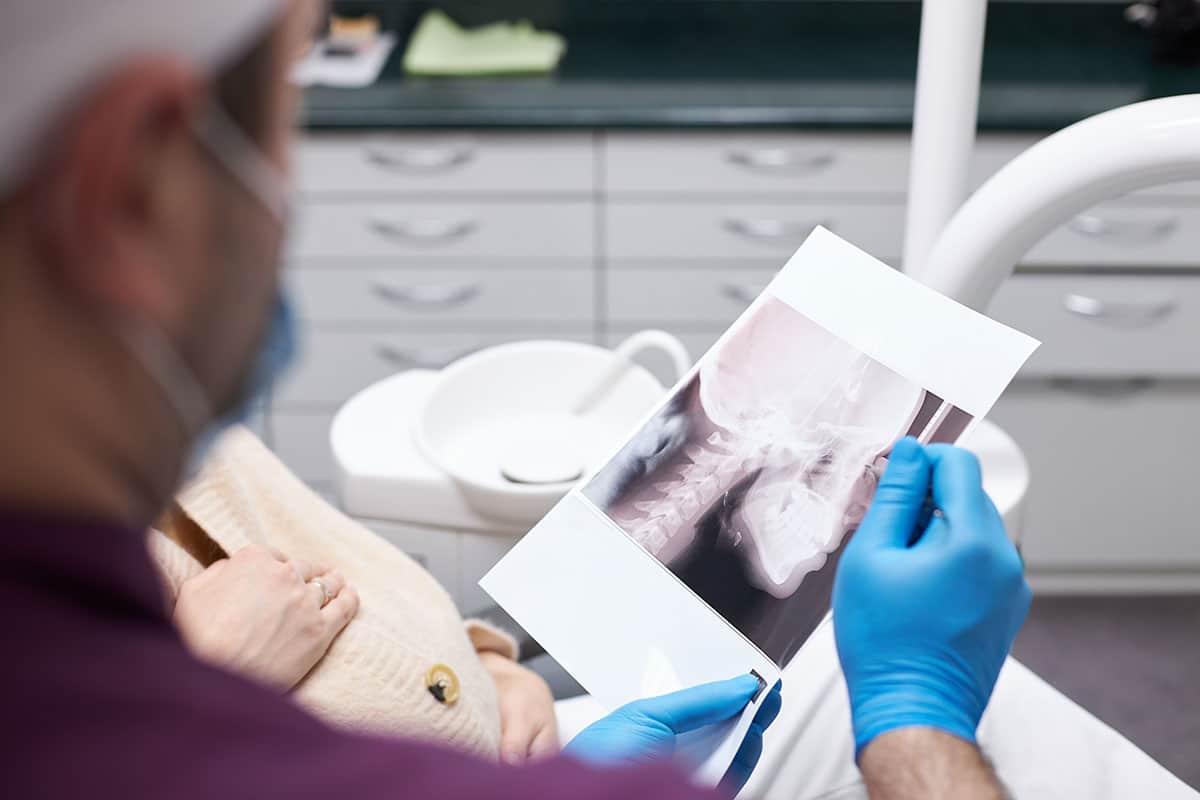
Yes, there are alternatives to traditional X-rays for dental work, especially when it comes to minimizing radiation exposure, which might be a concern during pregnancy or in certain medical situations.
Digital x-rays
These X-rays use electronic sensors instead of traditional film, reducing radiation exposure. They also allow for quicker image processing and the ability to enhance and zoom in on specific areas for more accurate diagnoses.
Cone Beam Computed Tomography (CBCT)
CBCT is a three-dimensional imaging technique that provides detailed images of the oral and maxillofacial regions. While it involves more radiation than traditional X-rays, it’s often used for more complex procedures like dental implant planning.
Panoramic x-rays
In a single shot, panoramic X-rays capture an image of your entire mouth, including your teeth, jaws, and surrounding structures. They use less radiation than traditional X-rays and are useful for general assessments.
Intraoral cameras
These cameras capture detailed images of specific areas within your mouth. While they’re not suitable for diagnosing all dental issues, they can be used to visualize localized problems.
Visual inspection and palpation
For some dental issues, dentists might rely on visual inspection and manual examination (palpation) to identify problems like cavities, gum disease, or oral lesions.
Transillumination devices
These devices use light to highlight areas of concern within teeth, potentially aiding in identifying cavities and cracks.
Is it safe to have oral surgery during pregnancy?
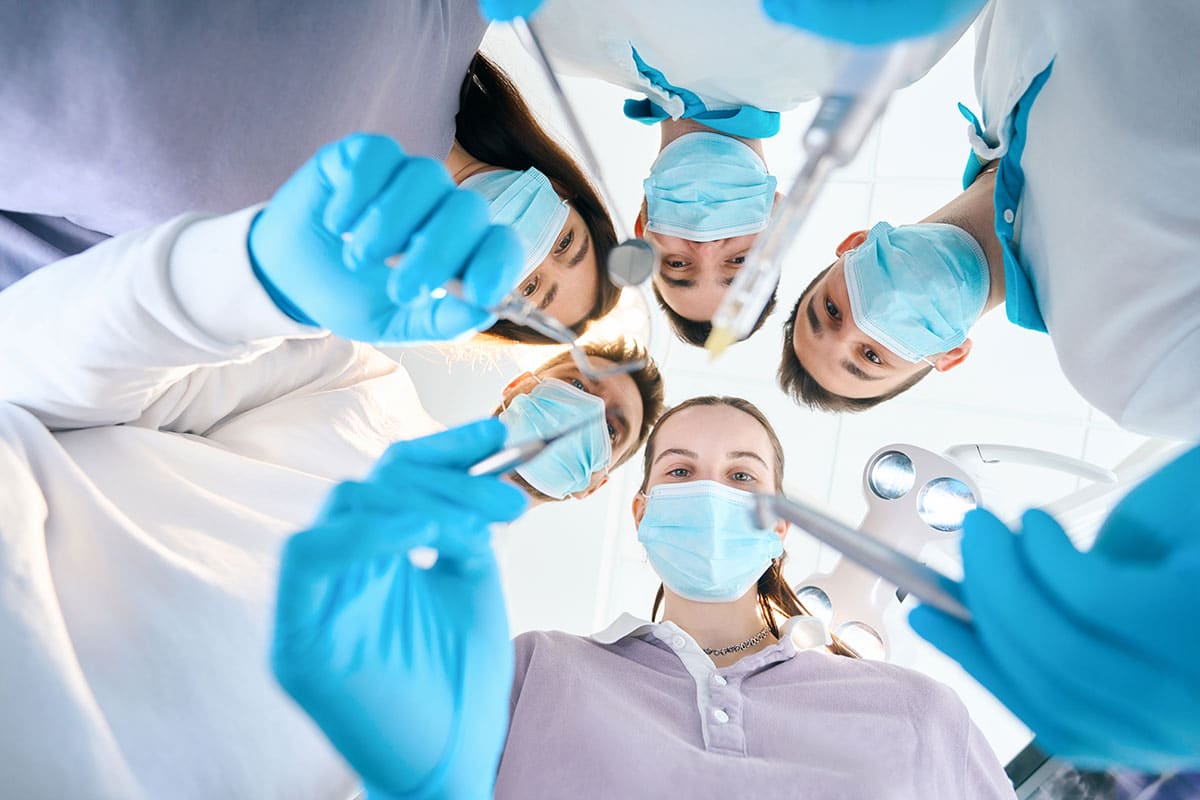
Oral surgery during pregnancy is generally avoided unless it’s absolutely necessary for your health or your baby’s health. While many routine dental treatments can be safely performed during pregnancy, oral surgery, which usually involves more extensive procedures, might come with additional considerations. Here are some factors to consider:
Surgery timing
If possible, oral surgery is often postponed until after pregnancy, preferably during the second trimester. By this time, the risk of miscarriage is lower, and the baby’s major organs have already formed.
Type of surgery
The necessity of the surgery plays a significant role. If the oral surgery is urgent and cannot be postponed, your healthcare provider and dentist will work together to assess the risks and benefits.
Anesthesia and medications
The type of anesthesia and medications used during the surgery are important factors. Your healthcare provider and dentist will need to select medications that are considered safe for use during pregnancy.
The health of the mother
The overall health of the pregnant individual also matters. If the oral issue is causing significant pain, infection, or other health complications, the risks of delaying treatment might outweigh the risks of the surgery.
Risk of infection
Infections, including dental infections, can potentially impact the mother and the baby. If an infection is present, your healthcare provider might recommend oral surgery to prevent complications.
Is it safe to use an anesthetic when pregnant?
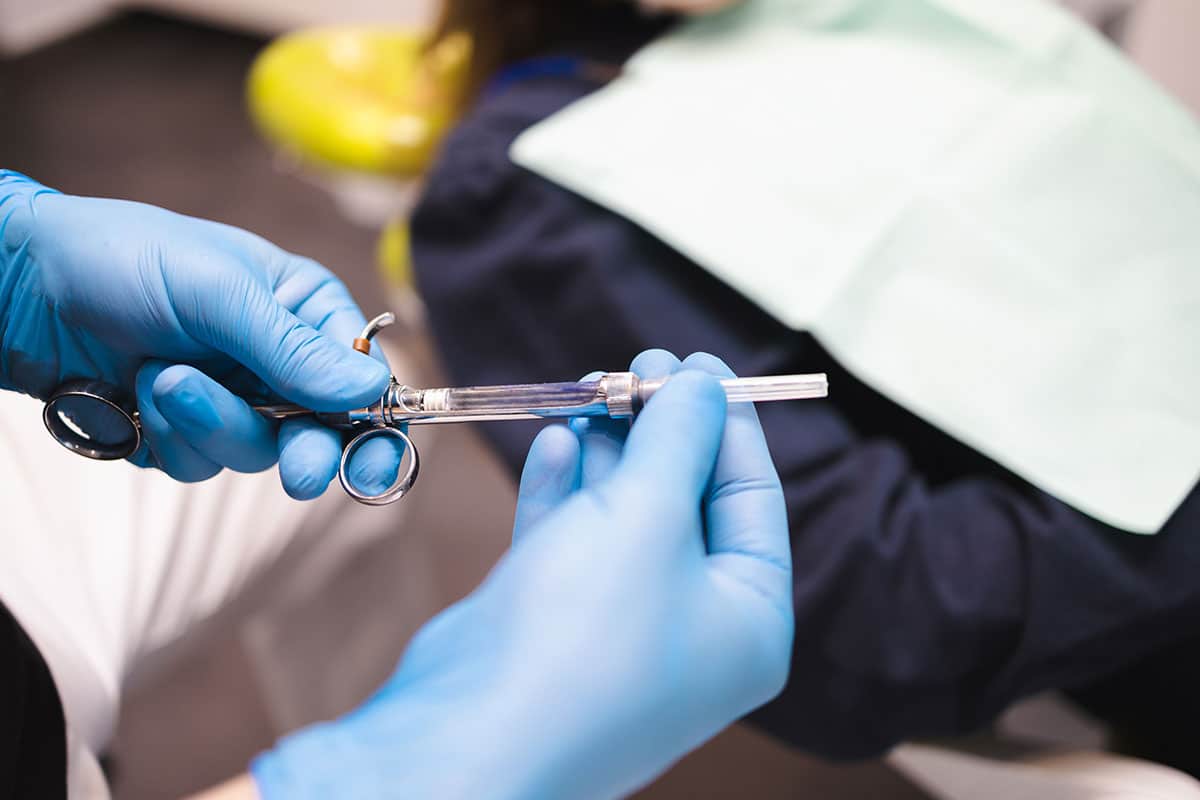
If a dental procedure cannot be postponed until after you give birth, you can still receive safe anesthesia to help alleviate pain. The first step in planning the best course of action is to speak with your dentist about the pregnancy so the feasibility, type and dosage can be determined.
Avoid anesthetics containing felypressin during pregnancy, as this substance narrows blood vessels, restricting blood flow to your baby. Your dentist will utilize the minimum effective concentration of anesthesia required to ensure your comfort and minimize stress on your baby.
Your individual circumstances play a significant role in whether or not anesthetics can be used, so consult with your dentist and voice your concerns or questions. They are professionals and will guide you through the process.
What can I take to manage dental pain while I’m pregnant?
Managing dental pain during pregnancy requires careful consideration of your comfort and your baby’s well-being. Here are some options to consider:
Acetaminophen/ Parasetomal (Tylenol)
Acetaminophen (also known as Parasetomal in some regions) is generally considered safe during pregnancy when taken according to the recommended dosage. It can help alleviate mild to moderate dental pain. However, avoid exceeding the recommended dose and consult your healthcare provider for any concerns.
Use a cold compress
Applying a cold compress or ice pack to the outside of your cheek for 15-20 minutes can help numb the area and reduce inflammation, temporarily relieving pain.
Saltwater rinse
Gargling with a warm saltwater solution can help reduce inflammation and promote healing. Mix half a teaspoon of salt in a glass of warm water and use it as a mouthwash several times daily.
Topical anesthetics
Over-the-counter oral gels containing benzocaine might provide localized relief from gum and mouth discomfort. However, use these sparingly and as directed, as excessive use can lead to adverse effects.
Elevate your head
When lying down, prop your head up with pillows to help reduce blood flow to the affected area, which might ease pain and discomfort.
Maintain good oral hygiene
Continue brushing and flossing regularly to prevent further irritation or infection. Use a soft-bristled toothbrush and be gentle around the affected area.
Stay hydrated
Drinking plenty of water helps keep your mouth moist and can minimize discomfort.
Avoid irritating foods
Avoid very hot or cold foods and beverages and highly acidic or sugary items that could worsen the pain.
Are root canals safe if you’re pregnant?
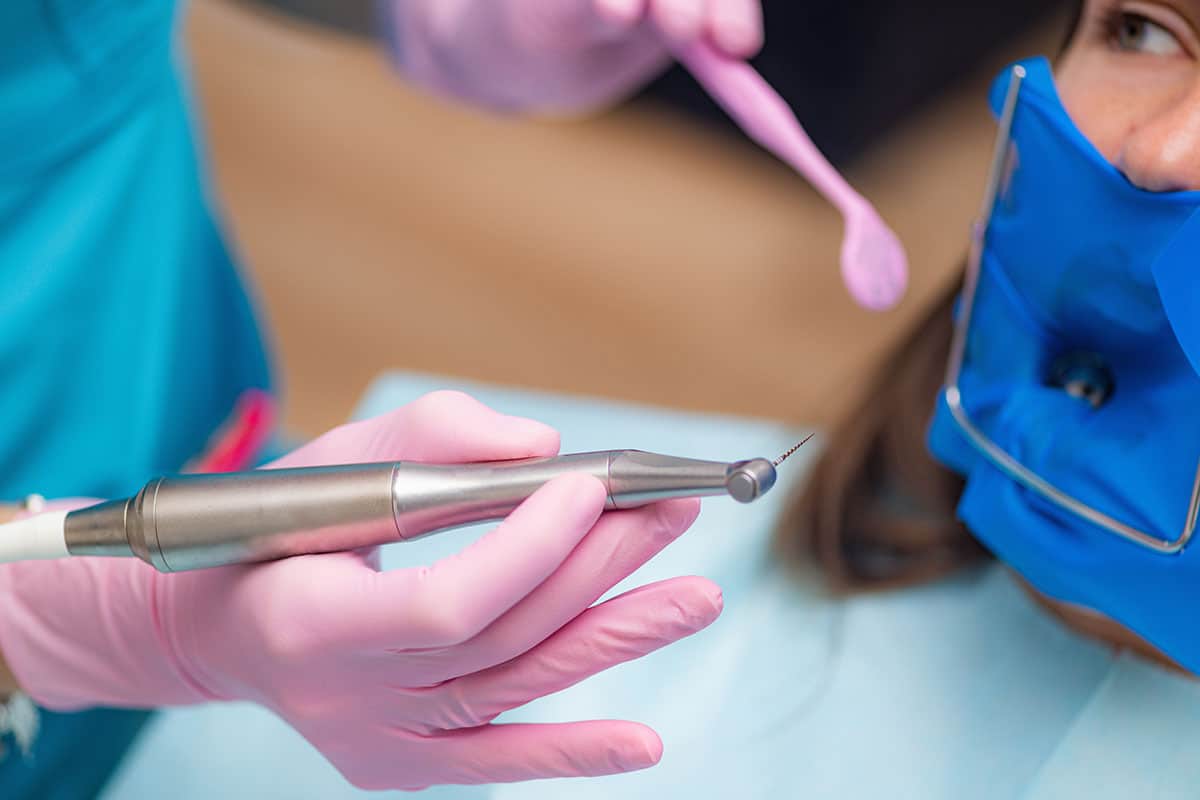
Suppose a tooth has decayed to the point where you’re experiencing nerve pain; a root canal procedure may be required. If possible, your dentist will delay the procedure until after your pregnancy due to the required x-rays and time in the dentist’s chair (a local anesthetic is safe). While root canals are generally avoided during pregnancy, if an emergency intervention is necessary, it’s safest to have a root canal done during the second trimester.
Can I have a cavity repaired while pregnant?
Minor procedures such as cavity repair or tooth extractions can be safely performed during all stages of pregnancy. Treatments that don’t require X-rays or more than a local anesthetic are safe and don’t harm your baby. Your dentist may still try to schedule the procedure during your second trimester, but that’s more for your comfort than anything else.
Is teeth whitening safe during pregnancy?
While teeth whitening can be safely performed during pregnancy, it is recommended to get it done before pregnancy or postpone it until afterwards. This is mainly because you might not be comfortable in the dentist’s chair if you’re feeling nauseous (first trimester) or unable to lie on your back for an extended period (third trimester).
Patients often have tooth sensitivity pain or a sore jaw after a professional whitening treatment, and most pain medications are not recommended during pregnancy. It is also generally a good idea to reduce your stress as much as possible while pregnant, including spending an afternoon at the dentist.
Is it safe to get a tooth pulled while pregnant?
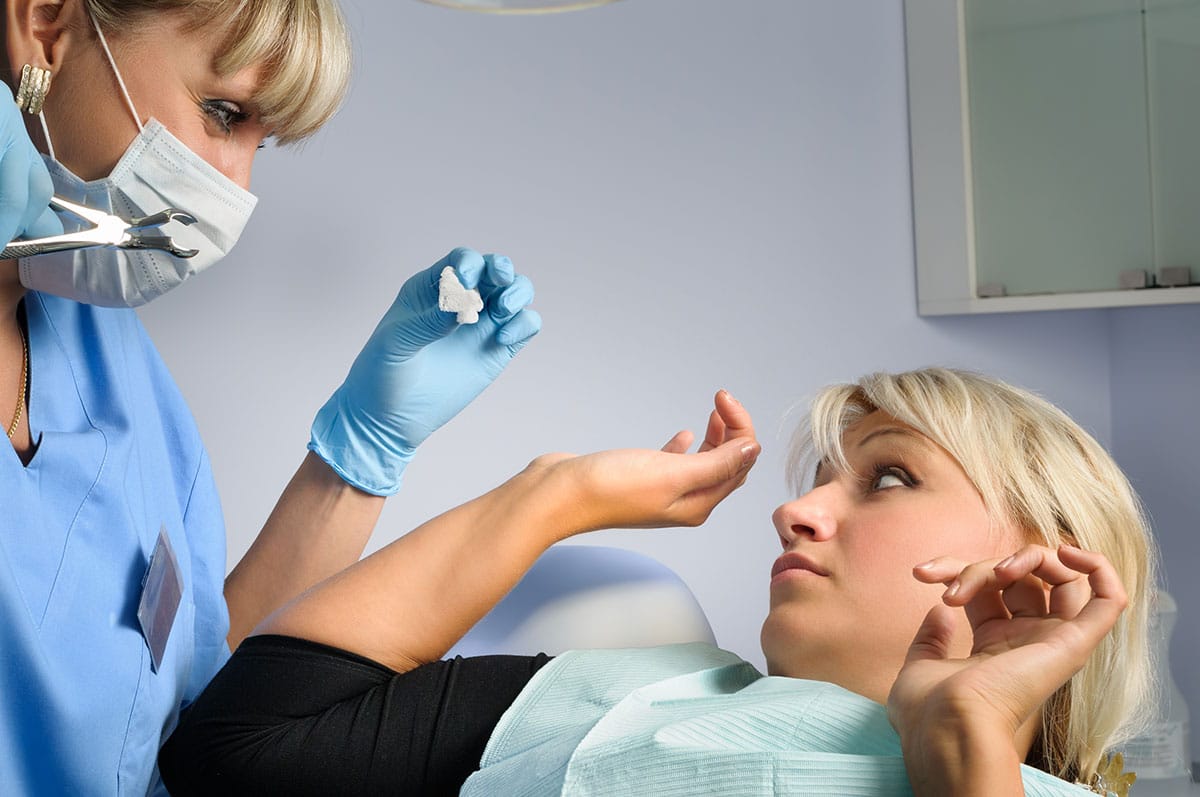
If you’re pregnant or not, your dentist will always try to save your tooth if they can. However, tooth extraction is possible during pregnancy if you have a badly damaged tooth that cannot be repaired and poses a risk to your oral health.
As with most dental procedures during pregnancy, the second trimester is the best time as it avoids x-rays during the first trimester and the discomfort associated with the dentist’s chair in your third trimester.
Can I get my teeth cleaned while pregnant?
Professional teeth cleaning is not only safe during pregnancy, it’s highly recommended. Your oral health is very important; having your dentist inspect your mouth regularly is the best way to ensure you steer clear of avoidable issues. There are several advantages to dental cleaning during pregnancy, such as:
Keep your gums healthy
Pregnancy can cause hormonal changes, making your gums more susceptible to inflammation and gum disease. Regular dental cleanings can help prevent and manage gingivitis and periodontal disease linked to adverse pregnancy outcomes like preterm birth.
Remove plaque and tartar
Professional dental cleanings remove built-up plaque and tartar that can’t be effectively addressed through regular brushing and flossing alone. This helps prevent cavities and reduces the risk of more extensive dental issues.
Watch for pregnancy tumours
Some pregnant individuals develop pregnancy tumours or pyogenic granulomas, which are non-cancerous growths on the gums. Dental cleanings can help manage these growths and prevent them from becoming more problematic.
Bad breath prevention
Hormonal changes during pregnancy can sometimes lead to bad breath. Regular cleanings can help control bacteria growth and minimize this issue.
Increase your comfort
Maintaining good oral health can prevent toothaches, discomfort, and sensitivity, which can be especially beneficial when you might already be dealing with other physical changes and discomforts.
Overall health
Good oral health is linked to overall health. Poor oral health has been associated with an increased risk of conditions like cardiovascular disease, diabetes, and respiratory issues. By taking care of your oral health during pregnancy, you’re also contributing to your overall well-being.
Adopt a preventive approach
Regular dental cleanings are a preventive measure that can help you avoid more extensive dental treatments that might be less desirable during pregnancy.
Should I visit the dentist before getting pregnant?

This is a good question, and the answer is yes. If you’re thinking about having a baby, it’s a good idea to try and schedule as many planned treatments as possible and take care of any potential dental issues before you’re pregnant. Oral surgery treatments like wisdom teeth extractions or dental implants must be done before pregnancy due to the complications involving anesthetics and pain medications (more on this topic later). Even teeth whitening or veneers are best performed before you’ve got a bun in the oven. Cleaning your teeth (dental check-up included) is recommended before, during, and after pregnancy.
Several dental procedures can’t be done during pregnancy; others might not make for the most comfortable experience. This is because when you’re pregnant, your options for anesthesia, pain relief, and pain management are limited, so any major dental work should be done ahead of time, or it might have to wait. It’s still fine health-wise to have a cavity treated or your teeth cleaned at any time, but having fingers and dental tools in your mouth while you’re feeling nauseous might not be very comfortable. Likewise, laying on your back in the dentist’s chair for extended periods during your third trimester isn’t a great idea.
If you’re unsure how to proceed, a simple consultation with your dentist can be an enlightening experience and give you one less thing to worry about.
In conclusion: At a glance, advice for dental care and pregnancy
- Visiting the dentist while pregnant is ok, but make sure you inform them of your pregnancy
- Dental cleaning appointments are a must
- Pregnant women are at greater risk of gingivitis and infections
- Try to avoid x-rays, anesthesia (local is ok) and antibiotics unless necessary
- Book an early cleaning appointment (first trimester)
- Get planned procedures out of the way before pregnancy or delay them until after
- If a procedure is required, the second trimester is the safest time
- Try to avoid dental treatment in the third trimester
- Take your oral hygiene seriously
Check us out on Facebook and Twitter for daily information about Oral Health from Martindale Dental, or visit our offices in Hamilton and St. Catharines.
Have more questions?
Please contact us for all inquiries or to book an appointment with one of our convenient clinic locations. We look forward to hearing from you.




